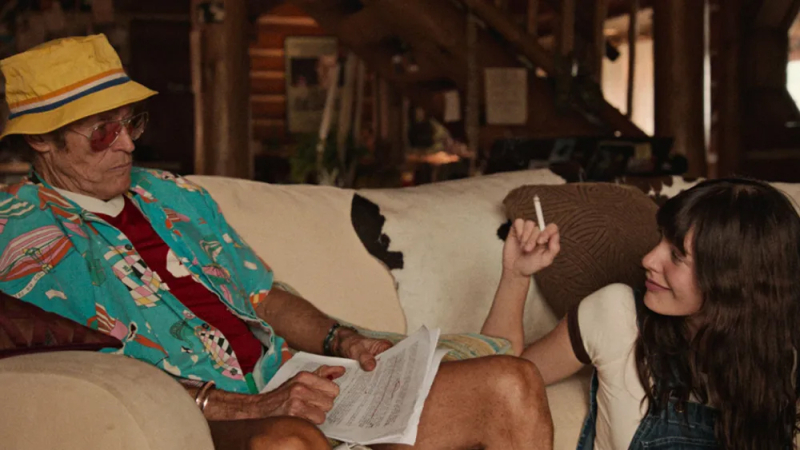
Bobby Bukowski
MOVIE REVIEW
Gonzo Girl (2023)
“Gonzo Girl” is thinly-veiled autobiography, based on a “novel” by a young writer who briefly found herself working for someone so clearly based on gonzo journalist Hunter S. Thompson the names didn’t really need to be changed. What is gonzo journalism, which Thompson invented and irritating generations of following journalists have imitated? Well, it’s 1. making yourself part of the story; 2. focusing on the seedier side of whatever you’re there to report upon; 3. actively participant in said seedier side, probably by doing buckets of drugs; 4. thereby rejecting your talent as a writer-journalist to focus on your talent for exploring life’s seedier side. This is not what anyone would have predicted Patricia Arquette would choose as the subject for her directorial debut, though she does competent, lively work. Yet despite the high-powered cast and a steady tour of the festival circuit culminating in this year’s Tribeca, it hasn’t been picked up for wider distribution. That’s because while there’s nothing really wrong with “Gonzo Girl,” unfortunately there’s nothing really right with it, either.
Alley (Camila Morrone) is barely out of college when she attends a talk in a New York bookshop given by famous gonzo journalist Walker Reade (Willem Dafoe), whose glory days are decades behind him. Of all the fans in the audience, Alley is the only one to scoff at Walker, meaning she catches the eye of Walker’s manager, Claudia (Ms. Arquette), who offers Alley a job. Walker is behind on a deadline and needs someone to keep him focused; and Alley thinks this will be a great opportunity to develop her own writing skills. More importantly she’s in the precise aimless window of early adulthood when a potential adventure is to be leapt at with the whole self. Walker lives in splendid isolation in the mountains of Colorado with Claudia, who handles the business side of his life; and Devaney (Elizabeth Lail), who is the personal side. Alley is there to get Walker in front of the typewriter by any means necessary. If that means partying all night with Walker and his friend the famous movie star (Ray Nicholson, quite the casting choice), well that is just the process. If that means some violent paintball with Walker and his dealer (Sean Penn, quite the cameo) in order to get him talking, well whom among us wouldn’t. If that means coaxing, threatening, begging, crying, well. Alley tries it all. But the only thing that works is her energy outlasting Walker’s and, while he is passed out, doing something that’s really a very bad idea.
Weirdly enough Ms. Arquette focuses on Alley trying to keep up with Walker drug-wise instead of literally anything else. Possibly thanks to the drugs, it takes Alley way too long to realize the well of Walker’s artistic talent has run dry. Now he is a vampire draining the sycophants and starfuckers around him, most of whom have taken this deal because they like him and/or his work and he pays for the drugs. But Alley thought she was there because she has talent of her own, even if she’s distracted from it by the mayhem and her own eagerness to please. There’s more than one scene of Alley serving up trays of cocaine for all the world like a stewardess. No one really asked her to do this. So why on Earth is it happening?
Mr. Dafoe, expert as always, makes Walker’s appetite for self-destruction almost entirely attractive. He is funny; he throws his money around; and he knows precisely just how badly he can behave before he pushes people too far. Mr. Dafoe calibrates exactly the line between Walker’s selfishness and charisma underlined by the undeniable pull of his skill. Walker has a gift for observation combined with enormous appetites, but success means he's lost his hunger. The joy of shaping stories through the written word no longer gets Walker off. The weary Claudia, the bitchy Devaney and the upset Alley might be all the audience Walker needs these days, but that won’t keep the dealers paid. So what is one famous journalist and his three female enablers to do?
It would have been much more interesting if the focus had been on two writers, at opposite ends of their careers, grappling with the limits of their talent. That could have been a juicy set-up even if screenwriters Jessica Caldwell and Rebecca Thomas, who adapted Cheryl della Pietra’s book, didn’t want to focus on how successful old people really just crave someone else’s youth. But that unpleasant generalization about old men and young women might have been a truth too far even in our (allegedly) post-#MeToo world. As it is, “Gonzo Girl” is worth seeing for Mr. Dafoe’s performance, but it won’t otherwise set the world alight. Let’s hope Ms. Arquette gets another chance to direct, though.
Comments